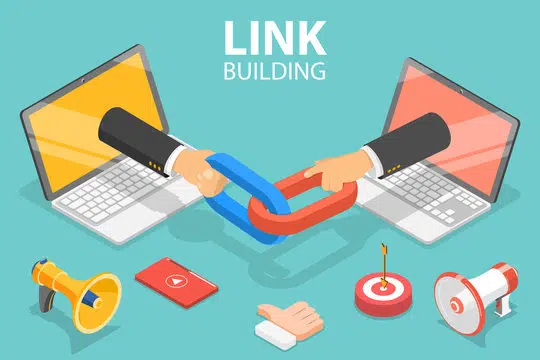When aiming to improve your website’s ranking on search engines, it can often feel like a challenging task. With numerous factors affecting rankings, where should you concentrate your efforts? One strategy that has consistently proven to make a significant difference is link building. This crucial aspect of SEO (search engine optimization) is vital for enhancing your site’s authority and improving its position in search results.
In this article, we’ll explore how link building works, the role of link building in SEO, and how you can use it to boost your website’s credibility in a meaningful, sustainable way.
What is SEO and Why Does it Matter?
Search Engine Optimization (SEO) is the process of improving your website’s visibility in search engine results pages (SERPs). When a user searches for specific terms or keywords, a well-optimized website will appear higher in the results, leading to increased traffic. Organic search results, which are unpaid listings, are generally more trusted by users than paid advertisements and can provide a consistent source of visitors without the need for continuous advertising expenditure.
There are several components to SEO, which can be grouped into three categories:
- On-page SEO: The optimization of elements on your own site, like content, titles, and meta descriptions.
- Off-page SEO: Strategies that take place outside of your site, such as gaining backlinks from other websites.
- Technical SEO: Ensuring that your site is technically sound—things like fast loading times, mobile optimization, and clean code.
Off-page SEO is crucial in establishing a website’s credibility and authority with search engines. Link building is one of the most effective strategies to improve off-page SEO.

Link Building: A Core Strategy in SEO
Link building is the process of acquiring hyperlinks from other websites to your own, commonly referred to as “backlinks.” At its core, link building helps search engines understand the authority and relevance of your site.
The more high-quality backlinks you have, the more search engines regard your site as a trusted source of information. Backlinks serve as pathways for search engine crawlers to discover your site, and they pass along what is known as “link juice,” which helps improve your site’s ranking. In SEO, backlinks are important because they function as votes of confidence from other websites. When a reputable site links to your content, search engines like Google perceive it as an endorsement, indicating that your website is valuable and trustworthy.
This is why link building can significantly enhance your website’s authority and improve your rankings over time. However, it’s not just about acquiring any links; it’s essential to obtain the right types of links from credible sources. Low-quality or irrelevant backlinks can have the opposite effect and potentially harm your site’s rankings. Therefore, it’s crucial to focus on building links from authoritative, relevant websites within your industry to ensure long-term SEO success.
Understanding Link Building
What Are Backlinks?
Backlinks are links from external websites that direct users to your content. The more high-quality backlinks you have, the more likely search engines are to consider your site authoritative and relevant. These external links serve as endorsements, signaling to search engines that your content is valuable and trustworthy. Backlinks are a crucial ranking factor for search engines, as they validate the credibility of your site. It’s important to be aware of the two types of backlinks:
- Internal links connect different pages within your website. They are important for guiding users and search engines around your site, and ensuring that content is indexed properly so that search engines can understand the structure of your site.
- External links (backlinks) are links from other websites that direct users to your site. They are key players in link building and SEO. Backlinks from reputable and relevant sources can significantly improve your site’s visibility and rankings. The more high-quality backlinks your site earns, the more likely it is to be considered an authoritative resource by search engines, which can lead to better search engine results page (SERP) rankings. These links are a major indicator of how search engines determine the value of your content.

How Link Building Works
When another website links to yours, it creates a pathway for search engine crawlers to follow. The more backlinks you have, the more routes there are for search engines to discover and index your pages. These backlinks also transfer what is known as “link juice,” which is a flow of authority and credibility that can enhance your site’s rankings.
For example, if a reputable site, such as a news outlet or a respected industry blog, links to your site, that link carries significant weight. Over time, these backlinks help strengthen your website’s reputation in the eyes of search engines.
Why Link Building is Crucial for SEO
The Evolution of Link Importance
In the past, Google’s algorithm prioritized the number of backlinks a website had, equating a higher number with greater authority. As Google’s algorithm evolved, it shifted its focus from quantity to quality.
Today, backlinks from authoritative and relevant websites are more valuable, demonstrating that quality supersedes quantity when developing a strong backlink profile. This, in short, is the importance of link building!

The Role of Backlinks in Establishing Trust
Backlinks also help establish your site’s credibility. When authoritative websites link to your content, they’re telling both users and search engines that your site is a trustworthy source. This boosts your reputation and signals to search engines that your website deserves higher rankings.
Additionally, backlinks contribute to better user experience. When users encounter links that lead them to relevant, high-quality content, it enhances their browsing experience. This can lead to longer time spent on your site, more engagement, and even more backlinks.
How Backlinks Improve Website Authority
Backlinks pass on what’s called “link juice,” which can increase the authority of your site. But what makes a backlink authoritative?
Factors That Affect Backlink Quality
- Domain authority: A backlink from a website with high domain authority (DA)—such as a well-established news site, academic institution, or popular blog—carries more weight than one from a lesser-known site.
- Relevance: The closer the content of the linking site is to your own, the more valuable the backlink will be. A link from a related industry site is far more beneficial than one from an unrelated niche.
- Placement and context: Where the link appears within the content and how it’s integrated also matters. Links in context-rich content (like blog posts or articles) tend to carry more authority than those in footers or sidebars.

Effective Link Building Strategies for SEO
To boost website authority with backlinks, you need a clear, strategic approach. Here are some link building strategies for SEO that have proven to be successful:
1. Create Shareable, High-Quality Content
Content is the foundation of any effective link-building strategy. When you create valuable, engaging content—whether it’s blog posts, infographics, or videos—others are more likely to link to it naturally. High-quality content is the key to earning natural backlinks over time.
2. Outreach and Relationship Building
A more proactive approach is to reach out to relevant websites, bloggers, and influencers in your industry. By establishing genuine relationships and offering something of value in return—such as guest posts, interviews, or collaborative content—you can encourage these sites to link back to your content.
3. Guest Blogging
Guest blogging is a great way to build backlinks while providing value to other sites. By writing high-quality guest posts for reputable blogs or websites in your industry, you can get your content in front of new audiences while also securing valuable backlinks.
4. Participate in Online Communities
Engaging in forums, Q&A platforms like Quora, and other online communities can help you build backlinks organically. By offering valuable insights and linking to relevant resources on your site, you can naturally attract backlinks.
5. Leverage Social Media
Sharing your content on social media is another way to increase your chances of earning backlinks. As people discover your content through social channels, some may link back to your website if they find it useful or relevant.
6. Internal Linking
Don’t overlook the power of internal links. Structuring your website with a strong internal linking system helps search engines index your pages effectively while also guiding users to related content. This boosts the overall SEO of your site.
It’s important to keep a few best practices in mind when focusing on link building:
- Focus on Relevance and Quality: Prioritize acquiring links from high-quality, relevant sources. A backlink from an authoritative site in your industry holds more weight than one from a low-ranking, unrelated website. Relevance helps search engines understand your content’s context and increases the chances of ranking higher for related search queries.
- Avoid Spammy Backlinks: Never attempt to manipulate your rankings by acquiring links from spammy, low-quality sites. These backlinks can harm your website’s reputation and may result in penalties or being deindexed by search engines.
- Diversify Your Link Profile: Build links from a variety of sources to avoid over-reliance on one type of backlink. A diverse link profile, including links from blogs, news sites, forums, and social media platforms, signals to search engines that your website is gaining genuine, broad-based recognition.
- Stay Away from Black Hat Techniques: Techniques like buying links or participating in link schemes may result in penalties from search engines. Search engines, particularly Google, are becoming increasingly sophisticated at detecting unnatural link-building tactics, and using them can severely harm your rankings, sometimes leading to the de-indexing of your site. Instead, focus on organic, ethical link-building methods that align with search engine guidelines.
Measuring the Success of Link Building
To track the effectiveness of your link-building efforts, it’s crucial to monitor several key metrics that reflect how your backlinks are impacting your website’s SEO performance:

- Domain Authority (DA) and Page Authority (PA): Tools like Moz, Ahrefs, and SEMrush allow you to track improvements in these metrics, which measure the overall strength and ranking potential of your domain and individual pages. A consistent increase in DA and PA over time suggests that your link-building strategy is successfully enhancing your site’s authority.
- Growth in Backlinks: It’s important to regularly monitor how many backlinks you’ve earned and assess the quality of those links. Tools like Ahrefs or Majestic provide backlink analysis to help you track new referring domains and identify high-quality links that are positively impacting your SEO efforts. Tracking the growth of backlinks helps ensure that you’re gaining links from valuable sources.
- Organic Traffic and Rankings: Ultimately, the success of link building should be reflected in improvements in organic traffic and keyword rankings. Use Google Analytics and Google Search Console to track the increase in organic visits to your site and monitor how your rankings for targeted keywords evolve. A steady rise in traffic and rankings suggests that your link-building strategy is driving the desired SEO results.
Conclusion
Link building is one of the most effective ways to boost website authority with backlinks and improve your SEO performance. By focusing on quality over quantity, using strategic outreach, and prioritizing ethical practices, you can enhance your site’s credibility and build a sustainable SEO foundation. Acquiring backlinks from authoritative, relevant sources is far more valuable than amassing links from low-quality sites.
Remember, link building isn’t a quick fix—it’s a long-term commitment that requires consistency and strategy. Building relationships, creating shareable content, and monitoring your progress is all part of a successful strategy. But with the right approach, it can pay off in stronger search rankings, greater authority, and increased organic traffic. Over time, a solid link-building strategy helps establish your website as an industry leader, continually driving more visitors and boosting your online presence. This steady growth is the key to long-term SEO success.